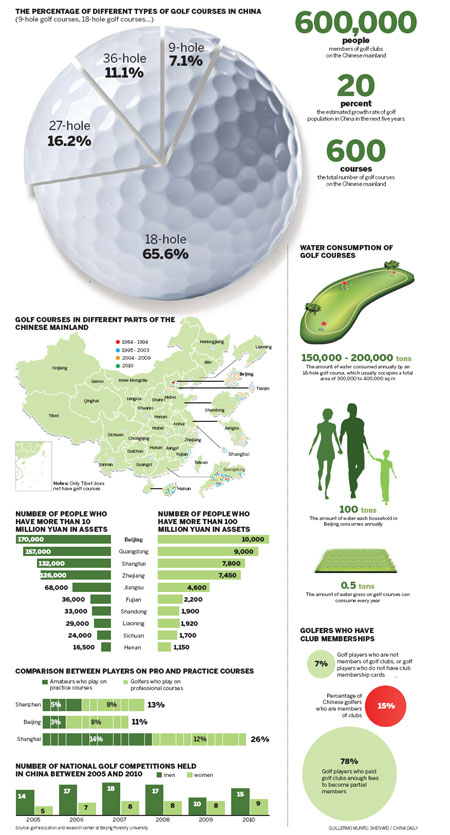Golf mania developing in China
Updated: 2011-10-06 08:04
By Shen Jingting (China Daily)
|
|||||||||

With more and more Chinese people, including successful businessmen, chief executive officers and white-collar workers, developing a strong interest in golf, which is sometimes called a 'battle of wits and courage', the sport is becoming a prosperous industry in China. Shen Jingting reports.
Golf is a "green opium", joked Li Xiaoming, a 52-year-old Beijing businessman who played the sport almost every day in the year that he was most fanatical about it.
Li has been hitting the links for more than 16 years. He was the champion of the Amateur Golf Tournament in China and participated in the China Open, a men's golf tournament that has been held annually in China since 1995.
"But I was not interested in going to golf courses at all at the very beginning because I regarded it as a game for the old," Li said.
However, his friend successfully persuaded him to have a try. They went to a golf course in Hainan province and, all of a sudden, Li found himself surprised and delighted by the course's beautiful natural scenery.
"I was out of breath after I played nine holes and had to sit under a tree for a rest," Li said. Golf is not only a sport that trains people's bodies, but it is also a complicated mental exercise. "The amazing thing about golf is that it's like participating in a psychological war with your rivals. It's a battle of wits and courage."
Li spends 100,000 yuan ($15,640) a year playing golf and lost 10 kilograms during the past decade. "Although I am in my 50s, I feel no difference in terms of health from when I was young," the tanned man said.
There are a growing number of Chinese people that have developed a strong interest in golf. In Beijing there are about 65 golf courses. The capital city has seen a trend developing as increasing numbers of people go to golf clubs for both the sport and as a social activity.
The average price for playing 18 holes in Beijing is between 600 and 800 yuan but most golf clubs only allow their members to play.
The membership fee, usually between 100,000 yuan and 1.7 million yuan, tends to keep the general public away.
But even at such high prices, memberships are still eagerly sought. Bayhood No 9 Golf Club, one of the most luxurious clubs in Beijing, previously charged 1.08 million yuan for membership. It is now no longer open to new members because it risks being oversubscribed.
"During the weekends, it is really hard to make a reservation at golf clubs that lie within the Fifth Ring Road in Beijing. Usually we drive to Langfang or Zhuozhou (in Hebei province) to find a golf course which is not that crowded," said Yang Yue, a golf enthusiast.
Chang Zhihui, a researcher with the golf education and research center at Beijing Forestry University, estimated 600,000 people on the Chinese mainland are members of golf clubs. The figure is expected to increase by 20 percent every year.
Beijing, Shanghai, and Guangdong, as well as Shandong and Hainan provinces, are the top five golf destinations in China, containing about 600 golf courses in total, Chang said.
The venues coincide closely with the places where there are the highest number of millionaires in China. According to the 2011 Hurun Wealth Report co-released in April by Hurun Research Institute and GroupM Knowledge Center, Beijing was the area with the most multimillionaires. Guangdong province ranked second and Shanghai third.
The report said the number of Chinese multimillionaires was rising beyond people's expectations - about 960,000 people on the Chinese mainland are worth more than 10 million yuan, including 60,000 people worth 100 million yuan.
"In the past, golf players were usually successful businessmen and chief executive officers, but now, more and more white-collar workers are trying the sport," Chang added. If people have a monthly income of more than 10,000 yuan, they can afford some games and, therefore, become target clients of golf clubs, he said.
However, of China's huge population base of 1.34 billion, the number of Chinese golf players accounts for less than 0.1 percent. In some developed countries, such as the United States, the figure is 10 percent across its total population.
"That indicates an enormous growth potential for China's golf industry," Chang said.
The strong demand has prompted rapid construction of golf courses, something that some have been critical of because they occupy valuable land resources and use a lot of water.
Grass on golf courses can require as much as half a ton of water for every square meter annually.
"An 18-hole golf course, which usually occupies a total grass area of 300,000 to 400,000 sq m, could probably use 150,000 to 200,000 tons of water a year," said Han Liebao, executive deputy director of the golf education and research center at the Beijing Forestry University.
In 2004, the State Council forbade the construction of new golf courses. However, the ban has been violated and hundreds of new golf courses have emerged during the past seven years. Most are euphemistically called sports or leisure clubs.
In June this year, 11 Chinese ministries collectively ordered new checks on all golf courses to prevent illegal land use and seizures and to ensure no loss of farmland in China.










